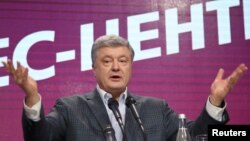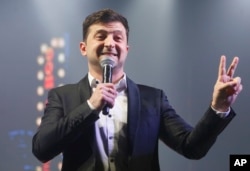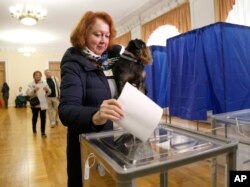This story originated in VOA's Ukrainian Service. Pete Cobus contributed to this report.
LONDON - Ukrainians who live abroad strongly prefer sitting President Petro Poroshenko to other candidates in last weekend’s first-round presidential election, contradicting the choice of voters who reside within the eastern European nation.
According to official tallies of votes cast in Ukraine, comedian-turned-actor Volodymyr Zelenskiy was the preferred choice of 30 percent of the electorate, giving the novice politician a commanding lead over the incumbent Poroshenko, who came in a distant second with roughly 16 percent of the vote.
According to official tallies from Ukraine's 101 foreign polling stations, however, the majority of Ukraine’s 20 million-strong expat community -- less than a half-million of whom are registered to vote -- gave Poroshenko 38.9 percent of their estimated 55,000 ballots, leaving Zelenskiy with 26.1 percent, and the difference split among the first round’s other 37 candidates.
Geographic voter preferences
Like their Ukraine-based counterparts, who handed victory to Zelenskiy in 20 of 25 reporting oblasts -- the five outliers located the country’s far east and west respectively -- voter preference among members of the country’s global diaspora also tended to be geographically clustered.
Poroshenko, for example, was the clear favorite among Ukrainians based the United States, where he garnered 56 percent of the vote. He enjoyed similarly strong showings in Canada (49.9 percent), the United Kingdom (52 percent), France (46 percent) and Germany (42 percent). He also claimed landslides (between 53 and 59 percent) in Ireland, Switzerland, Norway, Montenegro, Thailand and Australia.
Zelenskiy had a significantly stronger showing throughout Central and Eastern European countries such as Latvia (43 percent), Belarus (41 percent), Slovakia (40 percent), Hungary (32 percent), along with victories in Armenia, Czech Republic and Georgia. Zelenskiy also captured 38 percent of Poland’s Ukrainian diaspora.
Overall, Poroshenko claimed victory in 53 of the 71 foreign nations where Ukrainian expats are eligible to vote; Zelenskiy triumphed in 16 of them, whereas pro-Russian Ukrainian politician Yuri Boyko won in Estonia and Moldova with 35 and 33 percent respectively.
The breakdown suggests that Western-based Ukrainian voters tended to vote more conservatively than their Central- and Eastern-European counterparts, who appeared more amenable to voting for a newcomer.
Poroshenko, a 53-year-old confectionary magnate before he was elected five years ago, saw his approval ratings slip amid Ukraine's economic turbulence during the first part of his term. Although real wages have ultimately increased and the economy is growing, ongoing dissatisfaction with cronyism and demands for more effective actions against corruption prompted him to build a re-election campaign that vows to defeat the Russian-backed separatists in the east and to wrest back control of Crimea, the Black Sea peninsula that Russia annexed in 2014.
Zelenskiy, 41, who plays a schoolteacher-turned-president infuriated by corruption in a popular television sitcom, made fighting corruption a focus of his actual candidacy, in which he proposed a lifetime ban on holding public office for anyone convicted of graft. He also called for new direct negotiations with Russia on ending the conflict in eastern Ukraine, although he has yet to provide a detailed plan of action.
Boyko, 60, the Russian-friendly candidate who performed well in Estonia and Moldova, claimed 11.6 percent of votes cast on Ukrainian soil, where campaign vows to represent Ukraine’s “Russian-speaking population” notched victories in the ethnic-Russian strongholds of Luhansk and Donbass in Ukraine’s war-torn eastern flank.
Ukrainian officials refused to recognize votes cast by Ukrainians living in Russia, citing an inability to guarantee that a country with whom it is at war would conduct fair and transparent polling procedures. Although wire news outlets reported that some Russia-based Ukrainians did cast ballots from authorized polling stations in Finland and Belarus, data recorded in previous years show that Russia-based Ukrainians aren’t particularly engaged in domestic Ukrainian affairs.
This year’s foreign turnout cast 18,000 fewer votes than in 2014, when about 73,000 members of the Ukrainian diaspora helped push Poroshenko into office.
Long treks to the polls
In the United States, some diaspora members drove hundreds of miles to cast their votes.
“We drove about 15 hours yesterday," Yaroslav Kuznetsov of Tampa, Florida, told VOA Ukrainian, explaining that Ukrainian voting laws required expats to vote at their nearest consulate.
For Kuznetsov, that entailed a trek to Washington, D.C., but one that he didn't mind making.
"Its very important for the country for Ukraine for our future," he said.
Ukrainian-American Andriy Nemchenko flew to the nation's capital from Dallas, Texas.
“It’s most important elections because it is a chance for Ukraine to finally cut off ties with Russia," he told VOA.
In Ukraine, police officials said they had received more than 2,100 complaints of violations on voting day alone, in addition to hundreds of earlier voting fraud claims, including bribery attempts and removing ballots from polling stations.
But election monitors from the Organization for Security and Cooperation in Europe hailed Sunday's election as competitive and free, even though it criticized procedural violations and said there were indications that state resources were misused in the vote.
Zelenskiy and Poroshenko have advanced to a runoff on April 21.






